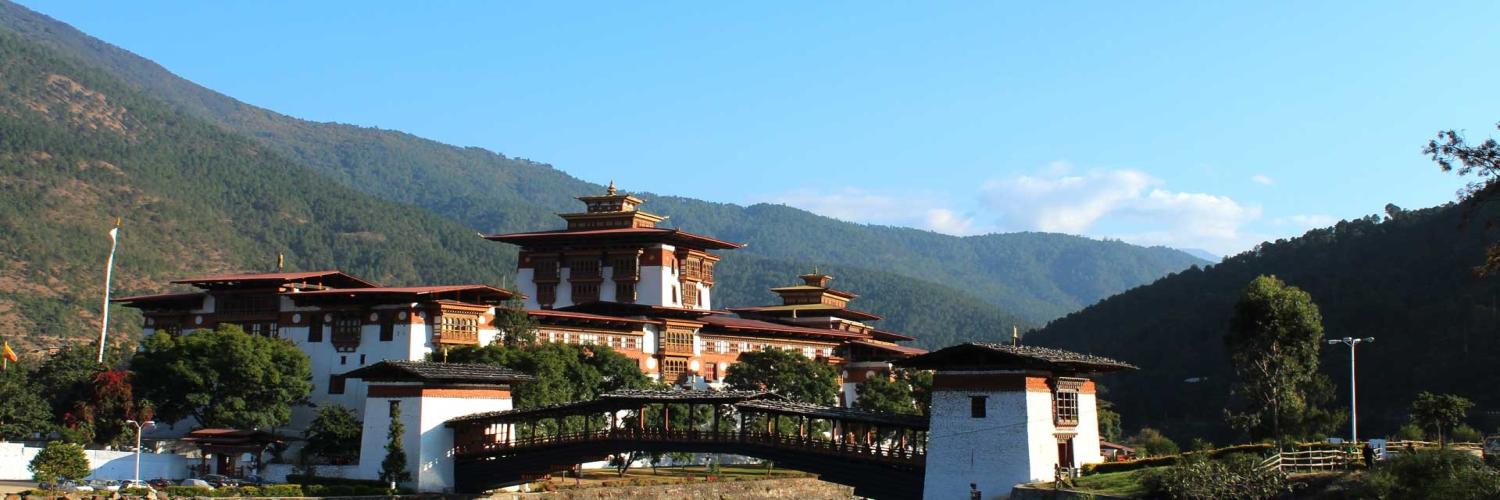Bhutan is a small landlocked country in the Eastern Himalayas popular for its untouched natural beauty, unique culture, and commitment to preserving its environment and traditions. Bhutan offers an exclusive travel experience with its spectacular monasteries, pristine environment, and warm hospitality.
Bhutan at a Glance
- Capital: Thimphu
- Geographical Location: Southern Asia located in the eastern Himalayas between China and India:
- Currency: Bhutanese Ngultrum (BTN)
- Official Language: Dzongkha
- Time Zone: Bhutan Time (BTT) UTC+6
- Best Time to Visit: March to May (spring) and September to November (autumn)
- Official religion: Mahayana Buddhism
- Telephone code: +975
Visa
All visitors (except citizens of India, Bangladesh, and the Maldives) to Bhutan must obtain a visa and a permit to enter the country. Visas are issued only through licensed tour operators. Upon full tour payment, a visa clearance letter will be sent, which needs to be shown upon arrival at Paro International Airport. Only then will the actual visa be stamped in the passport. A valid passport that is valid for at least six months after the Bhutan tour concludes is required. Bhutan visa fee is USD 40 per person (non-refundable)
Bhutan Royalty Fee
Apart from the tour cost, a Sustainable Development Fee of US$100 per person per night is applicable for Bhutan travel. It's a daily fee collected by the Bhutanese government from all tourists that goes towards the country's sustainable development such as the preservation of its pristine environment, rich culture and heritage.
Getting there
The easiest and most popular option to enter Bhutan is by flying into Paro International Airport. Only two airlines Druk Air (the national carrier) and Bhutan Air (a private company) fly to Paro and that too from certain cities like Kathmandu, Delhi, Kolkata, Dhaka, Bangkok, and Singapore.
Bhutan via road can be entered from neighboring countries like India like the Phuentsholing border in West Bengal, India,
Best Time to Visit
The best time for Bhutan travel is from March to May and September to November which are high tourist seasons in Bhutan. During these months the weather is mild and the skies are clear making travel enjoyable and fun. The monsoon season from June to August can bring heavy rains and make travel difficult.
Accommodation
Bhutan offers a wide range of accommodations, ranging from luxury hotels to homestays and standard hotels which are government-approved. Usually the tour cost includes stays at 3-star hotels and can be upgraded to 4-star or 5-star by paying an extra.
Things to do
Bhutan offers several travel activities, from trekking in the Himalayas to cultural tours exploring ancient monasteries and temples including attending colorful festivals. Trekking in Bhutan is a unique experience with no crowds on the trail and camping treks only since no lodges are available on all trek routes. The Snowmen Trek is considered one of the world's toughest treks. Bhutan festivals are lively with locals and tourists both attending in large numbers where the most popular festivals are Paro Tshechu, Thimphu Tshechu. Other adventure activities in Bhutan include rafting, mountain biking.
Culture and etiquette
Bhutan has a rich cultural heritage, and traditional customs and etiquette are highly valued. It is important to respect local customs, dress modestly, and ask for permission before taking photographs, especially in religious sites.
Food
Bhutanese cuisine is a unique blend of flavors and spices, featuring dishes like Ema Datshi (chili and cheese stew- the national dish). Local cuisines are also great to try such as momos (dumplings), butter tea, Jasha Maru (Bhutanese version of chicken stew), Phaksha paa (pork cut in big slices), Puta (identical to Japanese Soba noodles)
Safety
Bhutan is a safe country for travelers, with low crime rates and a peaceful environment. However, it is important to take necessary precautions while traveling, such as following local regulations, and being aware of your surroundings.


